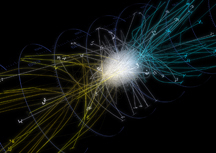Purdue physicist part of international antimatter experiment
June 23, 2014
 |
|
Trajectories of antihydrogen atoms from the ALPHA experiment. (Photo courtesy of Chukman So/University of California, Berkeley) |
WEST LAFAYETTE, Ind. — A Purdue University physicist is part of the international team of scientists uncovering a deeper understanding of fundamental physics through a search for the charge of antihydrogen.
The European Organization for Nuclear Research, or CERN, announced earlier this month that the international collaborators of the ALPHA experiment had obtained a measurement of the electric charge of antihydrogen atoms that was zero to eight decimal places. This is the first time the charge of an antiatom has been measured to high precision, according to CERN. A paper detailing the results was published in the journal Nature Communications.
Francis Robicheaux, a Purdue professor of physics, is part of a team of scientists who interpret the data collected from the ALPHA experiments, calculate the limits of what can be measured and identify what improvements to the experiment would be most beneficial for the next set of measurements.
It is theorized that antimatter is made up of particles, called antiparticles, that are identical to ordinary matter particles, but with an opposite charge. Whereas a hydrogen atom is made up of a positively charged proton and negatively charged electron, an antihydrogen atom is made up of a negatively charged antiproton and a positively charged positron. However, it is thought that at some point there is another difference that breaks the symmetry between matter and antimatter – and this is where the CERN search comes in. This difference could be within the property of electric charge, Robicheaux said.
"Just like the particles within regular atoms cancel each other out for a net charge of zero, antihydrogen should have no charge, but we have to measure it to be certain," said Robicheaux, who has been a part of the experiment since it began in 2006. "If we find instead that antihydrogen has a charge, we will have discovered an important asymmetry between matter and antimatter. This discovery would provide tremendous insight into the fundamental physics of our universe."
The experiments take place at CERN's antiproton decelerator, in Geneva, Switzerland. The ALPHA scientists study the trajectories of antihydrogen atoms released in the presence of an electric field. If the antihydrogen atoms had an electric charge, the electric field would deflect them and alter their trajectories.
New instrumentation is being created for the next step in the ALPHA experiments, ALPHA-2, which is expected to begin at the end of the summer.
"The results of the next round of experiments should be 1,000 times better and more accurate," Robicheaux said. "Then we will be able to put serious limits on what the charge could be."
Writer: Elizabeth K. Gardner, 765-494-2081, ekgardner@purdue.edu
Source: Francis Robicheaux, 765-494-3029, robichf@purdue.edu
CERN news release:
http://press.web.cern.ch/press-releases/2014/06/cerns-alpha-experiment-measures-charge-antihydrogen
